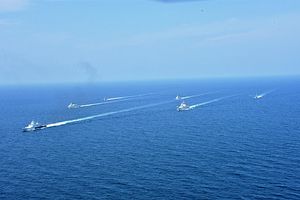Last week, Malaysia and Singapore concluded the latest iteration of their bilateral maritime exercise. The 30th round of Exercise Malapura reflects the ongoing military collaboration underway between the two Southeast Asian neighbors despite the lingering challenges in the bilateral relationship.
Though Malaysia and Singapore have had a rather prickly relationship in the past and problems do arise in ties from time to time, their militaries interact regularly through various bilateral exchanges and exercises as well as under multilateral arrangements, from the Five Power Defense Arrangements (FPDA), which also consists of Australia, New Zealand, and Britain, to Eyes-in-the-Sky combined air patrols to enhance maritime security in the Straits of Malacca.
One of the bilateral exercises is Exercise Malapura. Conducted since 1984, recent iterations have tended to involve around 600 personnel from the Republic of Singapore Navy (RSN) and the Royal Malaysian Navy (RMN).
This year’s iteration of Exercise Malapura was held from July 18 to July 28. The opening ceremony was held on July 19 in Lumut Naval Base in Malaysia and was officiated by RSN Fleet Commander Rear-Admiral Cheong Kwok Chien and RMN Western Fleet Commander Vice Admiral Mohamad Roslan bin Mohamad Ramli, while the closing ceremony was held at the RSN’s Fleet Command Building in RSS Singapura-Changi Naval Base.
The exercise saw both sides carry out joint planning and training at Malaysia’s Lumut Naval Base, and conducting conventional naval warfare and maritime security drills in the Malacca Strait, according to Singapore’s defense ministry (MINDEF).
Around 600 personnel from both navies participated, MINDEF said. The RSN participated with a frigate (RSS Formidable), a missile corvette (RSS Victory), a patrol vessel (RSS Resilience) and a Sikorsky S-70B Seahawk naval helicopter. Meanwhile, the RMN was represented by a frigate (KD Lekiu), a corvette (KD Kasturi), a patrol vessel (KD Selangor), and a Super Lynx helicopter.
Malaysia’s navy chief, Ahmad Kamarulzaman Ahmad Badaruddin, told reporters during the exercise last week that it played an important role in contributing to defense diplomacy of both countries despite the problems that they have from time to time.
“The 30-year exercise contributes to the spirit of defense diplomacy of both countries. Even though we have some problems, we are still able to cooperate and this is important to countries in the Asian region,” he said, according to Malaysia’s national news agency Bernama.

































